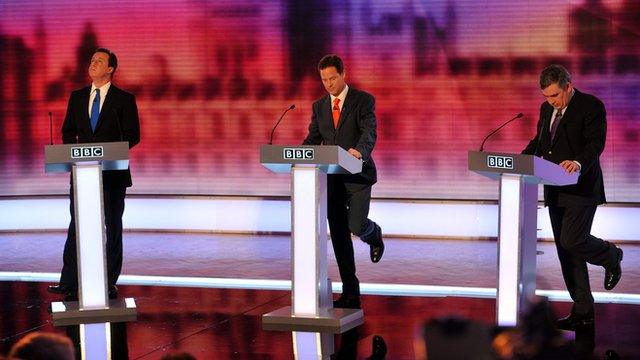Election 2015: Broadcasters expected to offer new TV debates plan
- Published
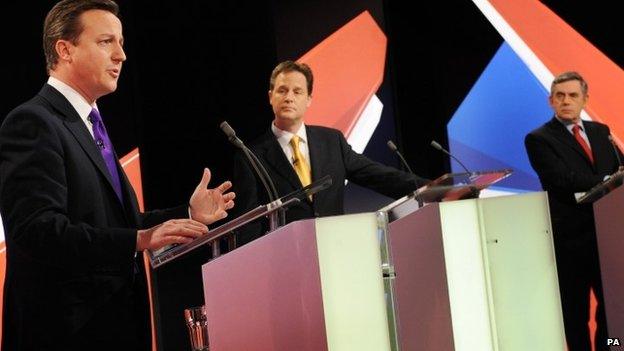
The first-ever election debates in 2010 were watched by 22 million people
Broadcasters are expected to put forward new proposals for the TV election debates which would include the SNP, Plaid Cymru and the Greens.
It comes after David Cameron refused to take part without the Green Party.
The BBC and ITV are expected to offer to stage seven-way debates including the Conservatives, Labour, Lib Dems, Greens, UKIP, SNP and Plaid.
But political parties in Northern Ireland are unhappy with the plan, saying they face being excluded.
The rethink by the broadcasters comes after a political row over the proposed format for the debates to be held during the election campaign.

Analysis by political correspondent Iain Watson
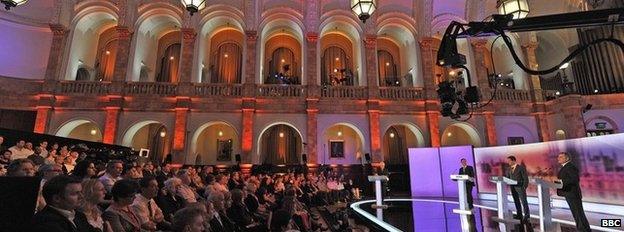
Fans of the BBC Four political drama Borgen will know all about the risks for major politicians that are inherent in a live televised debate.
In a cringeworthy scene, the former PM Birgitte Nyborg crashes and burns under questioning, while some of her rivals make their name.
It's the stuff of nightmare for political leaders.
So it's perhaps not surprising that David Cameron's advisers believe he has the most to lose from participation in any general election debates.
The broadcasters - or some of them at least - neither wanted to pull the debates entirely nor "empty-chair" a prime minister.
So they have gone out of their way - possibly at the expense of an engrossing spectacle for viewers - to accommodate his stated desire to include the Greens in any line-up.
With the SNP and Plaid Cymru also invited to take part, it's just possible this would be the least damaging option for David Cameron.
It may cast him in the role of a prime minister who can treat all opponents as minor parties - and he would certainly welcome the opportunity to demote his coalition partner Nick Clegg to the status of political pygmy.
But every solution brings a problem, it would seem.
Naturally enough, the Lib Dems aren't chuffed with the prospect of taking part in only two debates this time and not all three.
And it's possible that when negotiations with the parties begin on the new proposals both Labour and UKIP will say two potentially unwieldy debates with seven participants is over the top and wouldn't it be better to transform one of these into a clash between those which broadcasting regulator Ofcom regards as the "major" parties?
That would restrict the platform to David Cameron, Ed Miliband, Nick Clegg and Nigel Farage - but re-introduces the risk of the PM pulling out.
Meanwhile Northern Ireland's Democratic Unionist Party is huffed not be invited to any debate. If the Conservatives insist they should be asked, that could put a freshly-manufactured spanner in the works.
So the debate about the debates will continue.

The initial proposals only included the Conservatives, Labour, the Liberal Democrats and UKIP.
But the broadcasters are reportedly offering to expand two of the three debates to the Greens, SNP and Plaid Cymru, while also staging a head-to-head encounter between Mr Cameron and Ed Miliband.
Reacting to the news, Green Party in England and Wales leader Natalie Bennett told the BBC she had not received official confirmation of the revised proposals "but if it's correct, we are obviously absolutely delighted".
"We have really seen the acknowledgment that we are in multiparty politics in Britain, the politics of 2015. This is good for British democracy as well as good for the Green Party."
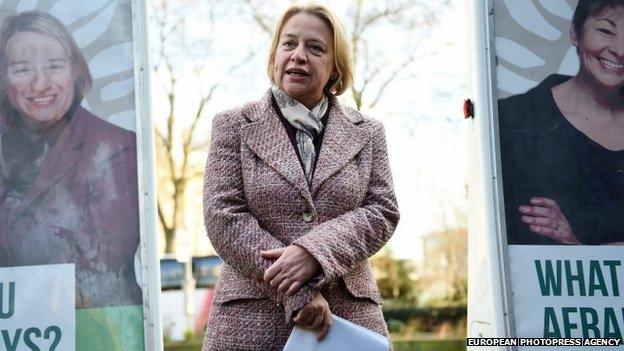
Ms Bennett has been campaigning for her party to be included in the live leaders' debates
Plaid Cymru leader Leanne Wood also welcomed the reports, saying it was important for democracy for voters to be presented with "a clear picture of the choice that they face on polling day".
'Welcome progress'
The SNP's Westminster leader, Angus Robertson, said the revised formats being reported was "very welcome progress", saying the case for the SNP's inclusion was "unanswerable".
"We want these debates to happen, and they need to include the SNP so that the diversity of politics and our democracy across the UK is reflected," he said.
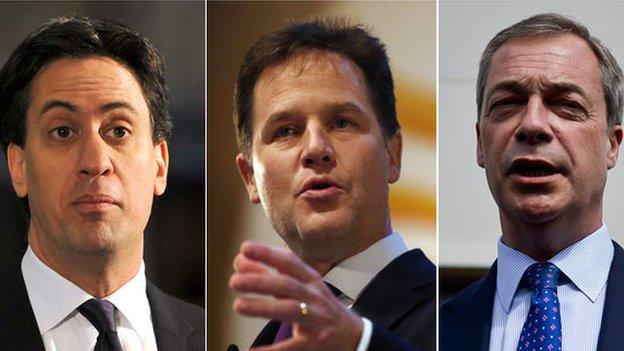
Mr Miliband, Mr Clegg and Mr Farage had urged broadcasters to push ahead with the debates without Mr Cameron
But the Liberal Democrats indicated they would oppose the revised proposals.
A spokesman for the party said it remained opposed to Mr Cameron and Mr Miliband being able to go head to head without Mr Clegg.
"We have always been clear that, as a party of government, we must be able to defend our record in all the TV debates," he said.
"We will continue to make that case in our discussions with the broadcasters."
'Farce'
The Democrat Unionist Party has indicated, external it will be writing to the BBC and ITV to ask why it is not being included when it is the fourth largest party at Westminster in terms of numbers of MPs.
Party leader and Northern Ireland First Minister Peter Robinson said the proposed debates were "a farce", with the DUP being "excluded from the national debate".
And Sinn Fein said it would "challenge any attempt to discriminate against us".
"Sinn Féin will take every opportunity to present and promote its policies and positions," a spokesman said.
A Labour Party source said: "We want general election TV debates to happen and we have always said who takes part is a matter for the broadcasters."
He said Mr Cameron faced a choice to either accept seven-way debates which could "split the left" or continue to resist them on the grounds they could "dominate the campaign".
The broadcasters said they "remain committed" to providing election debates during the general election campaign and "will continue to work with all the parties to ensure that they happen again in 2015".
In an interview , externalwith the Radio Times, Tony Hall, the BBC's director general, said it made "absolute sense to have the involvement of the Scottish National Party, Plaid Cymru, the Greens and UKIP".
"This time round the debates are going to be more important to democracy than last time round. I don't know anyone who can call this election, therefore the notion of hearing those who are competing for your vote being tested and testing one another, is much more important than last time round," he said.
The suggested schedule is for debates to be held on 2 April, 16 April and 30 April, ahead of the UK-wide poll on 7 May.
- Published14 January 2015
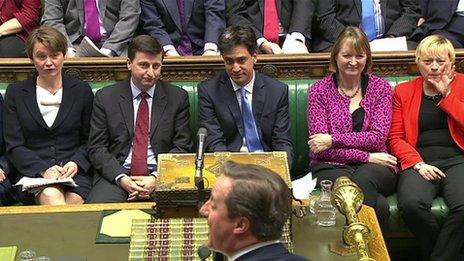
- Published18 January 2015
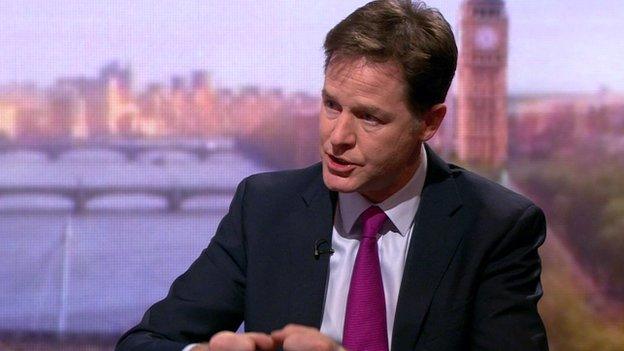
- Published15 January 2015
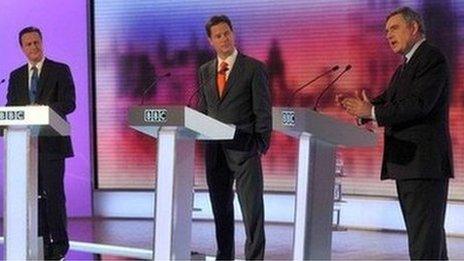
- Published10 January 2015
